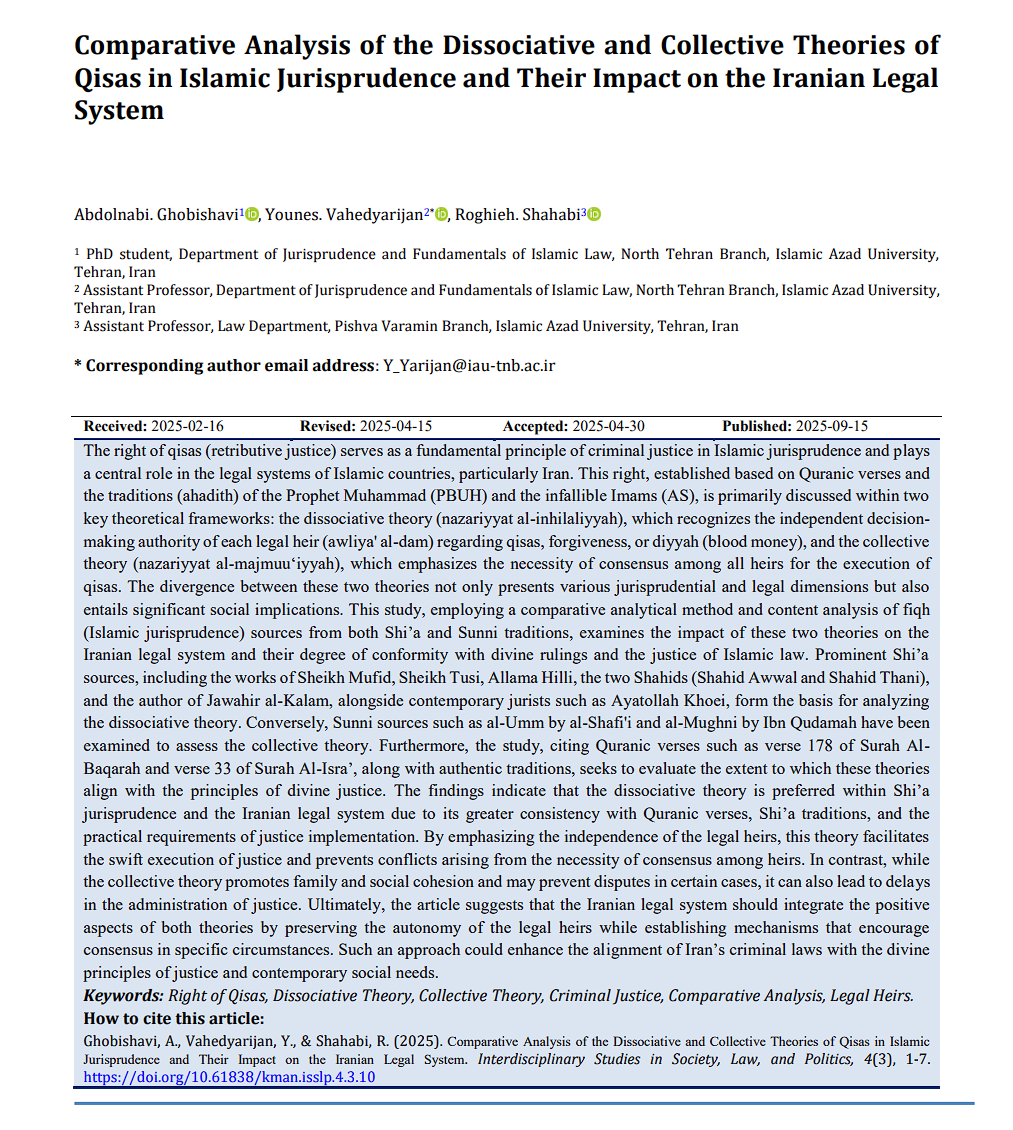Comparative Analysis of the Dissociative and Collective Theories of Qisas in Islamic Jurisprudence and Their Impact on the Iranian Legal System
Keywords:
Criminal Justice, Comparative Analysis, Legal Heirs, Collective Theory, Right of Qisas, Dissociative TheoryAbstract
The right of qisas (retributive justice) serves as a fundamental principle of criminal justice in Islamic jurisprudence and plays a central role in the legal systems of Islamic countries, particularly Iran. This right, established based on Quranic verses and the traditions (ahadith) of the Prophet Muhammad (PBUH) and the infallible Imams (AS), is primarily discussed within two key theoretical frameworks: the dissociative theory (nazariyyat al-inhilaliyyah), which recognizes the independent decision-making authority of each legal heir (awliya' al-dam) regarding qisas, forgiveness, or diyyah (blood money), and the collective theory (nazariyyat al-majmuu‘iyyah), which emphasizes the necessity of consensus among all heirs for the execution of qisas. The divergence between these two theories not only presents various jurisprudential and legal dimensions but also entails significant social implications. This study, employing a comparative analytical method and content analysis of fiqh (Islamic jurisprudence) sources from both Shi’a and Sunni traditions, examines the impact of these two theories on the Iranian legal system and their degree of conformity with divine rulings and the justice of Islamic law. Prominent Shi’a sources, including the works of Sheikh Mufid, Sheikh Tusi, Allama Hilli, the two Shahids (Shahid Awwal and Shahid Thani), and the author of Jawahir al-Kalam, alongside contemporary jurists such as Ayatollah Khoei, form the basis for analyzing the dissociative theory. Conversely, Sunni sources such as al-Umm by al-Shafi'i and al-Mughni by Ibn Qudamah have been examined to assess the collective theory. Furthermore, the study, citing Quranic verses such as verse 178 of Surah Al-Baqarah and verse 33 of Surah Al-Isra’, along with authentic traditions, seeks to evaluate the extent to which these theories align with the principles of divine justice. The findings indicate that the dissociative theory is preferred within Shi’a jurisprudence and the Iranian legal system due to its greater consistency with Quranic verses, Shi’a traditions, and the practical requirements of justice implementation. By emphasizing the independence of the legal heirs, this theory facilitates the swift execution of justice and prevents conflicts arising from the necessity of consensus among heirs. In contrast, while the collective theory promotes family and social cohesion and may prevent disputes in certain cases, it can also lead to delays in the administration of justice. Ultimately, the article suggests that the Iranian legal system should integrate the positive aspects of both theories by preserving the autonomy of the legal heirs while establishing mechanisms that encourage consensus in specific circumstances. Such an approach could enhance the alignment of Iran’s criminal laws with the divine principles of justice and contemporary social needs.
Downloads
References
Al-Hurr al-Amili, M. i. H. (1990). Wasa'il al-Shi'ah, Vol. 19. Al al-Bayt Institute Publications, Qom.
Al-Kulayni, A. J. f. M. i. Y. q. (2009). Al-Kafi, Vol. 7, Book of Blood Money. Dar al-Kutub al-Islamiyyah, Tehran.
Allama Hilli. (1984). Tahrir al-Ahkam al-Shar'iyyah 'ala Madhhab al-Imamiyyah. Islamic Publishing Institute, Qom.
Fakhr al-Razi. (1998). Al-Tafsir al-Kabir. Dar Ihya al-Turath al-Arabi, Beirut.
Ibn Qudamah, a. M. (1993). Al-Mughni, Vol. 9. Dar al-Fikr, Beirut.
Imam Shafi'i. (1993). Al-Umm. Dar al-Ma'arif Publications, Cairo.
Katouzian, N. (2009). Civil Law, Vol. 4. Company for Cooperative Publishing, Tehran.
Sahib al-Jawaher. (1995). Jawahir al-Kalam fi Sharh Shara'i al-Islam, Vol. 42. Dar Ihya al-Turath al-Arabi, Beirut.
Shahid al-Thani. (1992). Al-Rawdah al-Bahiyyah fi Sharh al-Lum'ah al-Dimashqiyyah. Office of Islamic Teachings Publications, Qom.

Downloads
Additional Files
Published
Submitted
Revised
Accepted
Issue
Section
License
Copyright (c) 2025 Abdolnabi Ghobishavi, Younes Vahedyarijan, Roghieh Shahabi (Author)

This work is licensed under a Creative Commons Attribution-NonCommercial 4.0 International License.





